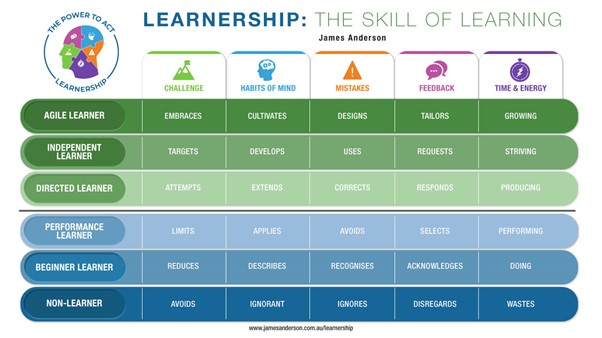Learnership – The Skill of Learning
Do you ever feel like you’re dragging your students through the learning process?
You set most of the challenges. You plan for and scaffold the learning. You find their mistakes, and then you show them how to correct them.
It can seem like some students just coast along. They complete most of the work, but you worry they’re not really challenging themselves.
One of my biggest concerns was that too many of my students weren’t taking charge of their learning. They were passive learners.
My students were learning the basic concepts and moving through the year levels. They were even getting decent grades and experiencing success in terms of achieving outcomes. But I often had the nagging feeling I wasn’t preparing them well enough for a life of learning.
I now realise these students lacked what I’ve come to call “Learnership”.
First, We Need Quality Teaching
Through my work with schools, I know the feelings I’ve shared above are experienced by teachers all over the world. It’s not that we aren’t good teachers. We are! I believe that teachers in today’s classrooms are amongst the most committed, best trained and best resourced we’ve ever had. But something has been missing from our practice.
Over the past 10 years, to improve student achievement, there has been an unprecedented focus on what quality teaching looks like. Many jurisdictions now have documents what quality teaching looks like.
I agree that we undoubtedly need skilful teachers who understand their students and how they learn. We need teachers who can build positive relationships, engage students in the learning process and provide purposeful instruction.
But quality teaching on its own is not enough. In fact, we may waste a lot of our time and professional learning budget if we don’t simultaneously focus on quality teaching and quality learning.
Quality Teaching Versus Quality Learning
The difference between quality teaching and quality learning is the difference between what the teacher does in the classroom and what the student does.
For example, most teachers recognise the importance of giving appropriate feedback to students. Skilful teachers understand how to carefully craft formative feedback. Learnership, however, is about how students respond to that feedback. The best quality feedback in the world delivered by the best teacher in the world won’t yield any benefit if the student ignores it.
In a similar way, we recognise the importance of teachers setting challenging learning goals. A skilful teacher identifies a student’s Learning Zone and challenges them appropriately. Learnership is about the student’s attitude towards those challenges. Many students avoid challenging tasks, choosing to do easy tasks over difficult ones.
At the end of the day, student achievement isn’t only about quality teaching. There is another part to the student achievement equation:
Student Achievement = Quality Teaching x Quality Learning
Quality Learning For and By Students = Learnership
Learnership is the skill of learning. It represents what quality learning looks like.
Think of Learnership in the same way you think of craftsmanship or leadership. It denotes a skilful act. As students develop their Learnership, they engage in the process of learning in increasingly effective ways. Consequently, they can achieve more.
The Learnership Matrix is a bit like an “International Learning Standards for Students”, describing five key characteristics of learning. By identifying a learner’s attitudes and responses to these five characteristics, we can define how skilfully they engage in the learning process.
Take a moment to reflect on the Learnership Matrix and identify how skilfully your students engage in the learning process.
Like all skills, Learnership is developed over time. While the Learnership Matrix is useful in identifying where students are in developing the skill of learning, the real value of understanding Learnership is that it informs teachers how to help students become more skilful learners. We are not just teachers of maths; we are teachers of learning!
Becoming Agile Learners
The most skilful learners are Agile Learners. These learners not only understand they are capable of growth (they have what we call a Growth Mindset), but they also understand how to achieve that growth. In many ways, they become their own teacher.
Agile Learners embrace challenges in the spirit of former US president John F. Kennedy, when he famously announced that America would put a man on the moon: “We choose to go to the moon … not because it is easy, but because it is hard.”
These students understand that challenges allow them to cultivate their Habits of Mind, giving them new, transferable skills and abilities they can apply in new and novel contexts.
Agile Learners recognise and value the need to gather new information. They actively seek to fill the gap between the known and unknown by having specific learning goals in mind and identifying the information they need to reach them. These learners proactively request feedback and tailor it to their goals.
Perhaps most importantly, Agile Learners value their time and energy as limited resources and wisely choose to invest them in achieving growth. They understand it’s not the amount of time and energy they spend that’s important, but rather how that time and energy are spent. They are careful to avoid wasting time that could be invested in self-improvement.
A Classroom of Skilful Learners
Imagine your classroom was filled with Agile Learners or even learners who have moved up just one level in the Learnership Matrix. How many frustrations described at the beginning of this article would reduce or disappear altogether? How much more would students achieve?
When we recognise that Student Achievement = Quality Teaching x Quality Learning, we draw attention to the importance of helping students become skilful learners and preparing them for a life of learning by developing their Learnership.
For further information about Learnership, please visit www.jamesanderson.com.au/learnership.
Best Wishes,
James
Stay connected with news and updates!
Join my mailing list to receive the latest news and updates about mindset, Habits of Mind, Learning Agility and more.
